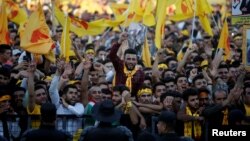ສອງພັກການເມືອງທີ່ສຳຄັນທີ່ປົກຄອງຕົນເອງໃນອີຣັກ ຢູ່ໃນຂົງເຂດເຄີດກຳລັງພາກັນ
ຮ້ອງໂຮວ່າມີການປອມແປງ ຫຼັງຈາກການເລືອກຕັ້ງສະພາໃນວັນອາທິດວານນີ້ ຊຶ່ງພັກ
ນຶ່ງກ່າວວ່າ ຕົນຈະປະຕິເສດ ບໍ່ຮັບເອົາຜົນການເລືອກຕັ້ງ.
ບັນດາຜູ້ສະໝັກເກືອບ 800 ຄົນ ໄດ້ແຂ່ງຂັນເອົາ 111 ບ່ອນນັ່ງ. ການອອກມາປ່ອນບັດ
ປາກົດວ່າມີຫຼາຍສົມຄວນ ເຖິງແມ່ນວ່າຊາວເຄີດຈະພະຍາຍາມຢຶນຢັນຄືນເຖິງການປົກ
ຄອງຕົນເອງ ຫຼັງຈາກການທັບມ້າງຈາກແບກແດັດ.
ສະຫະພັນຮັກຊາດຊາວເຄີດ (PUK) ຊຶ່ງແມ່ນນຶ່ງໃນຈຳນວນບັນດາພັກການເມືອງທີ່ສຳ
ຄັນ ກ່າວຕໍ່ ວີໂອເອ ວ່າ ຕົນຈະບໍ່ຮັບເອົາຜົນການລົງຄະແນນສຽງຂອງວັນອາທິດວານນີ້.
ໂຄສົກພັກ PUK ທ່ານຊາດີ ອາເມດ ປີຣາ ກ່າວຫາຫົວໜ້າຄູ່ແຂ່ງພັກການເມືອງຄື ພັກ
ຊາວເຄີດປະຊາທິປະໄຕພັກ (KDP) ວ່າປອມແປງການເລືອກຕັ້ງຢູ່ໃນສອງແຂວງທີ່ຢູ່
ພາຍໃຕ້ການປົກຄອງຂອງພັກ KDP.
ທ່ານປີຣາ ບໍ່ໄດ້ເວົ້າສະເພາະເຈາະຈົງ ແຕ່ກ່າວວ່າພັກ PUK ຮຽກຮ້ອງໃຫ້ມີການສືບ
ສວນຄືນ.
ໃນຂະນະດຽວກັນໂຄສົກພັກ KDP ທ່ານໂກສໂຣ ໂກຣານ ຜູ້ທີ່ໄດ້ກ່າວຕໍ່ວີໂອເອ ເຊັ່ນ
ດຽວກັນ ກໍໄດ້ຕ້ານການກ່າວຫາຄືນວ່າ ພັກ PUK ໄດ້ຢູ່ເບື້ອງຫຼັງການປອມແປງເລືອກ
ຕັ້ງຢູ່ໃນສອງເມືອງ. ທ່ານບໍ່ໄດ້ໃຫ້ລາຍລະອຽດຫຍັງເຊັ່ນກັນ.
ຄະນະກຳມະການເລືອກຕັ້ງຄົນນຶ່ງກ່າວວ່າ ບໍ່ມີພັກການເມືອງພັກໃດມີສິດທີ່ຈະປະຕິ
ເສດຜົນການເລືອກຕັ້ງ ແລະພຽງແຕ່ກ່າວວ່າ ມີແຕ່ຄະນະກຳມະການເທົ່ານັ້ນຈະສາມາດ
ເຮັດໄດ້.
ຊາວເຄີດອີຣັກຫຼາຍຄົນ ຢາກມີປະເທດເປັນເອກກະລາດ ແລະຫວັງຢາກມີບົດບາດຕໍ່ສູ້
ກັບພວກກໍ່ການຮ້າຍລັດອິສລາມ ທີ່ເປັນພາກສ່ວນການນຳພາແນວໂຮມສະຫະລັດ ເພື່ອ
ນຳເຂົາເຈົ້າໄປສູ່ເປົ້າໝາຍດັ່ງກ່າວ.
ແຕ່ວ່າສູນກາງລັດຖະບານອີຣັກ ໄດ້ປະກາດການເປັນເອກກະລາດຢ່າງປະຊາມະຕິ ປີ
ກາຍນີ້ວ່າຜິດກົດໝາຍ. ໄດ້ສົ່ງກຳລັງອີຣັກເຂົ້າສູ່ຂົງເຂດ ແລະຂັບໄລ່ຊາວເຄີດອອກ
ຈາກບັນດາທົ່ງນ້ຳມັນທີ່ສຳຄັນສຳລັບເສດຖະກິດຂອງຊາວເຄີດ.
Iraqi Kurds will head to the polls this Sunday to elect a new parliament for the semi-autonomous Kurdistan Region of Iraq, a year after a controversial independence referendum led to an armed crackdown from the Iraqi government.
The region’s politics have been dominated by a coalition between the pro-independence Kurdistan Democratic Party (KDP) and the left-leaning Patriotic Union of Kurdistan (PUK) for almost three decades.
A range of smaller parties have representation, but not enough to shift the balance of power.
Many observers expect turnout for this election to be lower than during the previous one, citing Kurd’s disenfranchisement with the political process over perceived corruption and voter fraud, and a lack of change in the region’s status. Others see the election as a chance to improve public perception of the region’s chaotic political system.
“I think at the end of the day it will be beneficial,” said Yousif Ismail of the Washington Kurdish Institute. “It gives more legitimacy to the Kurdistan region politics.”
“This election is not for all of Iraq,” he added, “which gives people more motivation to show up.”
Senior KDP leader Hoshyar Zebari echoed this sentiment, saying the election would be “critical to restoring the legitimacy of our institutions” following accusations of widespread fraud in nationwide parliamentary elections in Iraq in May.





